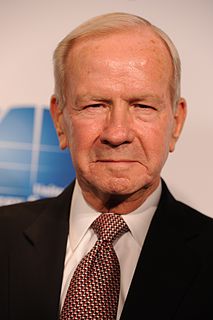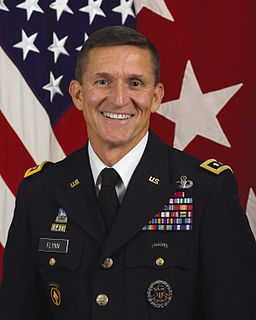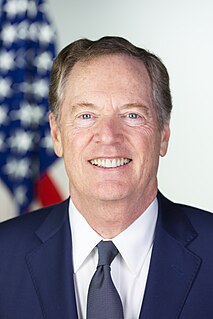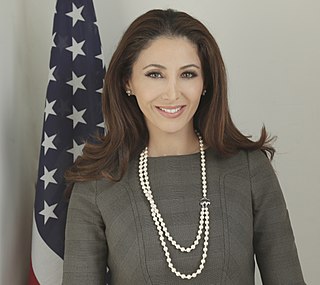
The White House National Security Council (NSC) is the principal forum used by the President of the United States for consideration of national security, military, and foreign policy matters with senior national security advisors and Cabinet officials and is part of the Executive Office of the President of the United States. Since its inception under Harry S. Truman, the function of the Council has been to advise and assist the President on national security and foreign policies. The Council also serves as the President's principal arm for coordinating these policies among various government agencies. The Council has counterparts in the national security councils of many other nations.
This article is about the history of the United States National Security Council, 1993 to the present.

Robert Carl "Bud" McFarlane is a retired Marine Corps officer who served as National Security Advisor to President of the United States Ronald Reagan from 1983 through 1985.

John Robert Bolton is an American attorney, political commentator, Republican consultant, former diplomat and national security advisor.

Stephen John Hadley is an American attorney and government employee who served as the 21st U.S. Assistant to the President for National Security Affairs, serving under President George W. Bush during the second term of his administration. Hadley was Deputy National Security Advisor during Bush's first term. Before that Hadley served in a variety of capacities in the defense and national security fields. He has also worked as a lawyer and consultant in private practice.
The Committee on Foreign Investment in the United States is an inter-agency committee of the United States Government that reviews the national security implications of foreign investments in U.S. companies or operations. Chaired by the United States Secretary of the Treasury, CFIUS includes representatives from 16 U.S. departments and agencies, including the Defense, State and Commerce departments, as well as the Department of Homeland Security.

Susan Elizabeth Rice is an American former public official who served as the 24th U.S. National Security Advisor to President Barack Obama from 2013 to 2017 and as U.S. Ambassador to the United Nations from 2009 to 2013. The U.S. Senate confirmed her as Ambassador by unanimous consent on January 22, 2009. A former Brookings Institution fellow, she served on the staff of the National Security Council and was the Assistant Secretary of State for African Affairs during President Bill Clinton's second term.

Peter Kent Navarro is an American economist and author. He serves in the Trump administration as the Assistant to the President, Director of Trade and Manufacturing Policy, and the national Defense Production Act policy coordinator. He previously served as a Deputy Assistant to the President and Director of the White House National Trade Council, a newly created entity in the executive branch of the U.S. government, until it was folded into the Office of Trade and Manufacturing Policy, a new role established by executive order in April 2017. He is also a professor emeritus of economics and public policy at the Paul Merage School of Business, University of California, Irvine, and the author of Death by China, among other publications.

Thomas E. Donilon is an American lawyer, business executive, and former government official who served as National Security Advisor in the Obama administration from 2010 to 2013. Donilon also worked in the Carter and Clinton administrations, including as Chief of Staff of the U.S. State Department. He is now Chairman of the BlackRock Investment Institute.

Michael Thomas Flynn is a retired United States Army lieutenant general who was the National Security Advisor to President Donald Trump.
Victoria C. Gardner Coates is an American art historian, blogger and political consultant. She has served as Senior Advisor to Energy Secretary Dan Brouillette since February 2020. She served on the United States National Security Council, originally as the Special Assistant to the President and Senior Director for Strategic Assessments before getting promoted to Deputy National Security Advisor upon the nomination of Robert C. O'Brien.

Stephen Miller is an American government official who serves as a senior advisor for policy to President Donald Trump. His politics have been described as far-right and anti-immigration. He was previously the communications director for then-Senator Jeff Sessions. He was also a press secretary for U.S. Representatives Michele Bachmann and John Shadegg.

Robert Emmet Lighthizer is an American attorney and government official who is the current United States Trade Representative.

Matthew Pottinger is an American former journalist and U.S. Marine Corps officer who has served as the United States Deputy National Security Advisor since September 22, 2019.

Mira Radielovic Ricardel, is an American government official who served as Deputy National Security Advisor from May 2018 to November 2018, until being fired at the request of First Lady Melania Trump. She has since joined the Chertoff Group.

Robert Story Karem is an American policy advisor and government official who currently serves as Assistant Secretary of Defense for International Security Affairs in the Department of Defense.

The Peace Treaty on Korean Peninsula is a proposed settlement to formally end military hostilities on the Korean Peninsula as a follow-up to the 1953 Korean Armistice Agreement implemented by the United Nations after the Korean War. During the inter-Korean summit on April 27, 2018, Kim Jong-un and Moon Jae-in signed the Panmunjom Declaration; the declaration involved an agreement about mutual efforts and action items for transforming the armistice agreement into a peace treaty with the cooperation of the United States and China. During the 2018 Trump–Kim summit, US president Donald Trump and Kim signed a Joint Statement which reaffirmed the Panmunjom Declaration.

Charles Martin Kupperman was the United States Deputy National Security Advisor for President Donald Trump, a position he held from January to September 2019. He also was the acting United States National Security Advisor for eight days in September 2019 between John Bolton and Robert C. O'Brien.

The 2019 Koreas–United States DMZ Summit was a one-day summit held at the Korean Demilitarized Zone between North Korean chairman Kim Jong-un, U.S. president Donald Trump, and South Korean president Moon Jae-in, following the 2019 G20 Osaka summit. Trump briefly stepped over the border at 3:45 PM (GMT+9) on June 30, marking the first time a sitting U.S. president had set foot on North Korean soil. It was also the second time since the end of the Korean War in 1953 that a North Korean leader entered the South's territory, following the April 2018 inter-Korean summit. Senior White House advisors Ivanka Trump and Jared Kushner, also attended the summit, with Ivanka Trump and U.S. envoy to South Korea Harry B. Harris Jr. holding a meeting with Kim later broadcast on North Korean TV.

Julia Nesheiwat is an American national security adviser currently serving as the 10th Homeland Security Advisor in the Donald Trump Administration.






















